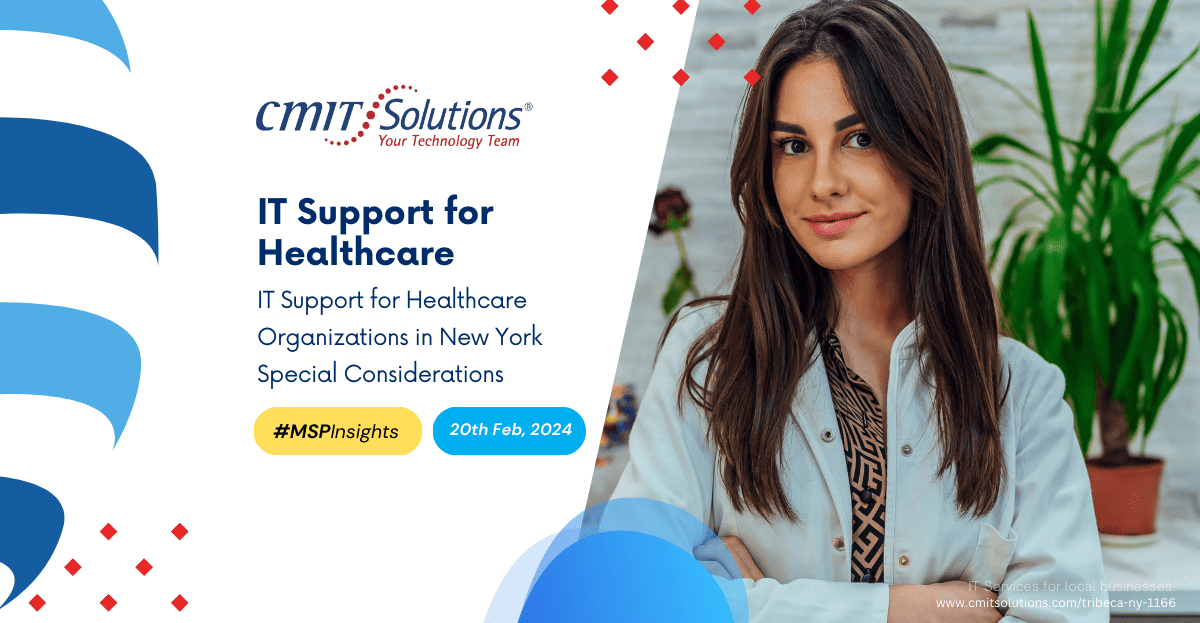The NY healthcare organisations work in an ever-changing and challenging world, which requires advanced IT support. Technology continues to play a crucial role in maintaining the validity and productivity of healthcare activities as changes take place within the healthcare environment. In this article, we focus on the specific difficulties that healthcare providers have to deal with, particularly in such a vibrant state as New York and discuss key issues of IT support in relation to EHRs, cybersecurity and compliance issues along with the protection of patient data.
I. The Dynamic Landscape of New York’s Healthcare Environment:
There are enormous healthcare organisations in New York that include large academic medical centres to community clinics. As such, the scale and plurality of the healthcare territory pose unique challenges that require customised IT support strategies. The IT infrastructure of healthcare organisations is also influenced by changes in regulatory standards, demographic shifts, and emerging trends in patient care provision.
II.Electronic Health Records (EHR) in New York Healthcare:
A new generation of Electronic Health Records (EHR) has become the backbone of modern day healthcare, simplifying patient management, reducing communication errors among health care providers and improving overall efficiency. Nevertheless, introducing and sustaining EHR systems in New York is also difficult.
A. Interoperability and Integration Challenges
In the integrated health care system, attaining interoperability between various EHR systems and healthcare providers is vital. Healthcare organisations in New York constantly face interoperability issues that make it hard to exchange patient information seamlessly. IT support needs to concentrate on creating solutions that would close the gaps between heterogeneous EHR systems and provide holistic services for patients.
B. Scalability for Large Healthcare Systems
Healthcare systems in New York such as the academic medical centres and hospital networks need scalable IT solutions. IT support teams have to create and implement EHR systems that are capable of processing the amount and complication of patient data while still being flexible enough to address healthcare’s transformation.
III.Cybersecurity Concerns in the New York Healthcare Sector:
The health care sector is a major target of cyberattack because the data in the hospitals are highly sensitive. With an abundance of healthcare organisations in New York, cybersecurity becomes the biggest issue.
A. Protecting Patient Privacy
HIPAA compliance is not an option for healthcare organisations. In order to prevent unauthorised access and maintain patient privacy, healthcare IT support teams need right cybersecurity measures in place.
B. Ransomware Threats
The rise of ransomware attacks represents a major threat to healthcare organisations in New York. Essential IT support strategies should include proactive steps, including regular system audits, training of employees, and cybersecurity tool implementation to prevent ransomware attacks that may jeopardise vital patient data.
IV.Compliance with Healthcare Regulations:
The New York healthcare organisations are bound by a number of state and federal regulations to provide the best patient care services ever possible and secure all data. IT support is essential in ensuring that companies comply with the regulations.
A. HIPAA Compliance
Compliance with HIPAA’s very strict standards is one of the priorities for health care companies in New York. Therefore, IT support teams are required to provide a secure infrastructure and data management practices in order to comply with HIPAA standards and maintain the privacy of patient information.
B. State-Specific Regulations
Healthcare organisations in New York must abide by the state’s unique regulatory framework regarding healthcare. IT support needs to understand these state-specific regulations in order to implement the systems and processes that follow local requirements but meet national standards.
V. Patient Data Protection:
Protecting patient information is both a legal requirement and essential to maintaining the confidence of patients. IT support strategies must focus on the safeguarding of patient information through storage, transmission and access restrictions.
A. Encryption and Access Controls
Encryption protocols and strong access controls must be implemented to protect patient data. Hence, IT support teams should implement encryption technologies for the protection of data during transfer and to ensure that only authorised people have access to confidential information.
B. Disaster Recovery and Business Continuity
In case of unforeseen events that may compromise the integrity of patient data, healthcare institutions in New York should be prepared. IT support tactics must involve efficient recovery and business continuity to be implemented upon any data breach or system failure.
VI. Custom IT Support Strategies for New York Healthcare:
Since the healthcare sector in New York has specific needs and compliance requirements, IT support strategies should be modified specifically for this industry.
A. Collaborative Partnerships
Collaborative relationships between healthcare organisations and IT support providers should be created. The IT partnerships make it possible to integrate IT solutions seamlessly, making customization of the systems more feasible for New York’s specific healthcare needs.
B. Real Scenarios as Well as Case Studies
Making use of actual cases and facts to depict effective implementations of IT support helps in coming up with useful learnings for the healthcare organisations. An analysis of cases where IT support solved these problems means most challenges to interoperability causes, cybersecurity risks and regulations issues could be an opportunity for guidance in others.
C. Continuous Training and Education
In the fast-changing digital age and healthcare policies, lifelong learning is essential. Healthcare staff therefore needs to be updated on a regular basis on current IT solutions, cybersecurity best practices and compliance requirements with workshops, seminars and online resources provided by the IT support teams. Thus, an IT infrastructure in healthcare institutions can remain stable and compliant with industry standards by investing in employee training programs.
Conclusion:
IT support linking it as the linchpin of New York’s healthcare industry, is underpinned by a fast-growing and dynamic environment that seeks to safeguard the integrity and efficiency of health care. And, from identification of challenges to overcome in implementing EHR systems to eliminating cyber threats and compliance ensuring availability for the healthcare standards – an individualised approach toward IT support should be actively utilised. Through patient information privacy enhancements, adoption of mutually beneficial cooperative partnerships and borrowing from previous successful examples in New York, healthcare organisations can maximise their IT support to provide enhanced care for patients and consistently high workplace performance.




